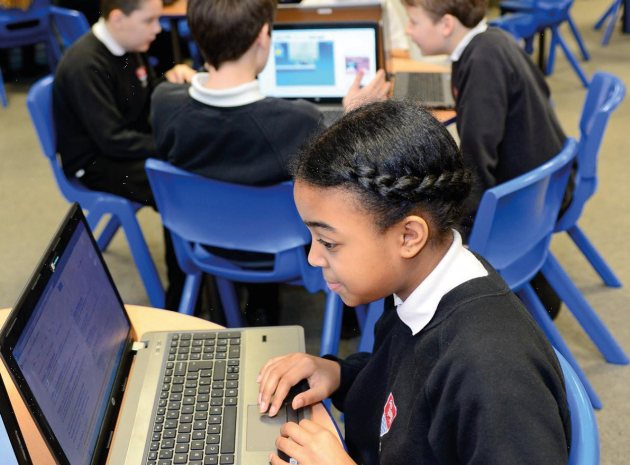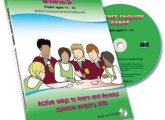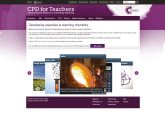I’m almost at the end of one of the toughest but most rewarding things I’ve ever done in my teaching career. As well as fulfilling my position as assistant head at Bedminster Down School in Bristol, during the last two years part of every weekend, and holiday – not to mention many evenings – have been dedicated to my own learning and in-depth research. By this time next year, seven colleagues and I will be able to add the letters MSc to our name. It has certainly been hard work, but undoubtedly worth the effort, both for the school and for ourselves.
In October 2014, in partnership with the University of Bristol, our senior leadership team introduced a 90 per cent funded opportunity for staff to undertake a Masters degree. Using our CPD budget we wanted to find a new way to broaden experiences, boost staff retention and engage critically with academic research in our chosen areas of interest. Staff would years and would be expected to remain at the school for an additional year after completion.
Personal challenge; professional growth
I was motivated to take the plunge as there are seemingly no ‘one size fits all’ solutions in teaching. Education is a series of experiments, sometimes successful and other times disastrous. Added to this there are countless fads and ‘neuromyths’ that offer answers but provide little in the way of real change. I felt that having a better understanding of the research available, and how to critically evaluate it, would prove to be incredibly beneficial as part of my professional development.
From a personal point of view I have often avoided large written assignments, choosing to focus on more practical pathways such as design and music.
The chance to complete a Masters in Education was an opportunity to prove to myself that I could meet that challenge as well.
In practical terms this has been a big commitment for me, both financially and in terms of time management. With SLT responsibilities and a family at home managing workload has been challenging. I’ve done this by working most evenings to complete my school responsibilities and dedicating a number of weekends and holidays, with the unstinting support of my wife Sara, to progressing through my Masters assignments.
Already leading to improvement
An important part of the process has been that throughout the taught units we have been able to adjust the focus of some of the assignments to a topic that is linked to our roles in school. The University offers core taught units on behaviour management, managing people and neuroscience that provide a strong base to follow our own interests. This has continued into the dissertation, with all the staff taking part developing real expertise in their chosen fields and roles in school. Subjects as diverse as CPD for middle leaders; developing self regulated learning in science; how we can enhance the transition program to support ASD children; and how E-learning can improve progress are now all being explored by staff.
As a school we’ve already seen developments in the tutorial programme, assessment methods, and student independence that directly stem from Masters work completed by colleagues. This is set to continue with the next cohort.
It is still relatively early days for the programme, as the first cohort members are just finishing their degrees. However we can already start to measure its success through practical interventions in our school practice such as our new selfregulated learning support, interest from neighbouring schools, a larger sign-up for the next Masters programme and the career progression of every single teacher who has taken part so far.
Practical outcomes: assessing the impact
Science teacher Rose Cherry has taken her Masters specialism on self-supported learning to prepare families and students at Bedminster Down School for the arrival of the new-style GCSEs.
Now in the final stages of her MA, Rose looked at how spending lesson time teaching students revision strategies can increase the development of self-regulatory learning skills. According to self-regulatory learning (SRL) theory, key components of supporting students in developing SRL skills include setting goals, planning and carrying out learning strategies, reviewing progress in relation to the goals and re-planning. This involves teaching the students skills such as time management, goal setting and reflective practices, such as monitoring what they have and have not completed.
Starting as a pilot last term with Y10s, the school now has two twilight workshops for students and parents each term. At these workshops students engage in activities that are designed to develop their self-regulated learning skills. Parents complete the activities, with their children, to increase their awareness of how they could support their child in their learning process at home. The aim is to enable parents to help their child plan, carry out and review their revision process at home.
“Reviewing and re-planning revision, based on what has been achieved, requires a high level of metacognitive ability,” explains Rose. “If parents can help students in the planning and reviewing of their revision, the children should develop metacognitive abilities enabling them to increase their level of self-regulation over time. As the development of self-regulated learning skills need to be developed over a long period of time, we are inviting all year groups for a workshop twice a year.
“Only through having the academic study behind this iniatiative have I been able to persuade leadership to back immersing self-regulated learning throughout the school. It’s early days but I’m having positive feedback from colleagues, students and parents who are getting prepared to face a summer of examinations.”
For more information about the Masters programme visit www.bristol.ac.uk/ education/students/masters
Ready for the challenge?
Peter Headeach suggests five tips to keep your progress on track when studying as a working teacher:
1. Start early
Those first years after qualification are an ideal time to embark on new academic study. Once your NQT year is out of the way but before you have gained lots more responsibility in school means you should have the time, space and enthusiasm for a research topic.
2. Think family
If you have family responsibilities you’ll need their support and understanding about what your study years will mean for everyone.
3. Access is everything
Your research topic should be partly guided by ease of access to the materials you’ll need. Will key interviewees, data and articles be available for you throughout?
4. Hit the internet
Sometimes it is hard to get started on a topic. Watching YouTube clips and TED talks on your chosen subject can help to get you inspired.
5. Strength in numbers
It certainly helps that there are a number of us on the same journey in school to share our ideas and concerns. Some of the most valuable conversations I have had have been with a ‘critical friend’










